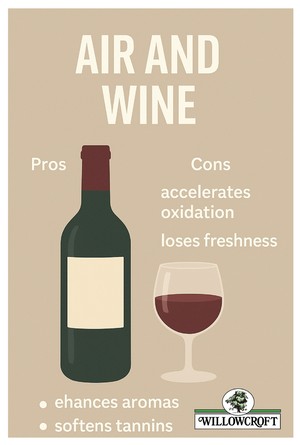The Truth About Corked Wine - Part III

Part 3: The Role of Air in Wine – Friend or Foe?
We’ve covered spotting a corked wine and what to do when it happens. Now, let’s explore the closely related topic of oxygen and wine. It can be both beneficial and harmful – depending on timing.
When Air Is a Good Thing
Pouring wine into a glass or decanter allows it to "breathe." This process lets aromas develop, and tannins soften. For younger, tightly structured wines, a little air exposure helps reveal more complexity and makes the wine more enjoyable.
When Air Is a Problem
Leave that same wine open for too long, and oxidation takes over. You’ll notice:
- Faded fruit flavors
- Flat, dull aromas
- A vinegar-like or sherry smell over time
This process can take hours or days, depending on the wine. After opening, proper storage (re-corking, vacuum pumps, refrigeration) is key.
Important Distinction: Cork Taint vs. Oxidation
If a wine smells like vinegar or cooked fruit, it’s likely oxidized – not corked. Corked wine smells musty and moldy, while oxidized wine smells flat or sour.
Final Tip: Decanting won’t fix a corked wine. If a musty smell lingers and fruit flavors are absent, it’s best to let that bottle go.
Stay tuned to Willowcroft for more wine education, pairing tips, and vineyard news. And if you ever get a corked wine here, let us know. We want every bottle you open to bring joy – not disappointment!

